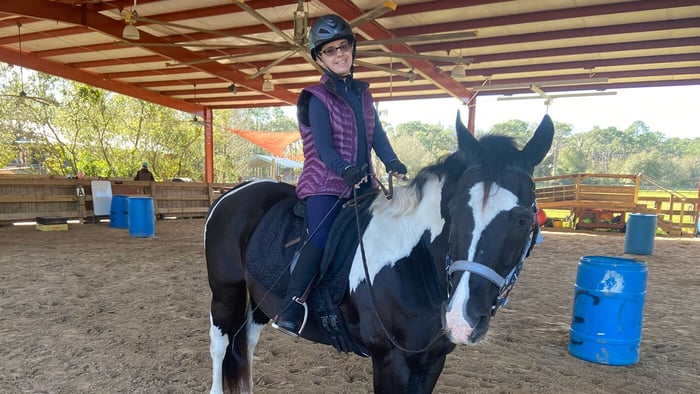Written by Bryanna Tanase
Although para-riders around the world face many challenges in their quest to be involved in sport, I will focus specifically on the USA, as it is the country I ride in and I am most familiar with the state of para-equestrian sports here.
There is still a great deal of stigma around the para-equestrian community. Many people are unsure about riders with disabilities participating in sport, but we know the risks it entails and are prepared to accept them, just like every other rider. Ableism is rampant within equestrian circles, and riders with disabilities are often turned away from lesson programs due to the liability involved, and the unaccommodating and close-minded nature of program staff. There have been many times I have been told to go somewhere else despite my enthusiasm for horses and sport, willingness to learn, and desire to assist with the day to day needs of the barn however I can. If the attitude of the facility staff is not an issue, another roadblock comes in the form of the accessibility of the facility itself. The main issue is that many stables in my area do not have a safe way for me to mount and dismount, but sometimes the accessibility can be so poor that I cannot get to the barn aisles to see the horses. Even if I suggest a solution to these issues that would not be too much of a hassle to implement, I am met with unwillingness to accommodate. Additionally, if we overcome the first two obstacles, there may not be a safe horse in the barn for me to ride. Sometimes, no matter how much the barn staff wants to help, there is no prudent way for me to ride and be engaged in the culture at a barn, so I have to give up on the opportunity and try to find something else. I would like to branch out from therapeutic riding centers to experience an able-bodied dressage barn, but I cannot do that without support from the staff there. I appreciate the few willing souls running able bodied barns that have tried to work with me recently, even if things did not work out in the end. Your support gives me hope that we can change the landscape of the industry and foster open-mindedness
There is also a lack of widespread access to resources and development opportunities for para-equestrians, both because of financial and geographic barriers. There are many clinics and seminars I would like to attend to help myself become a better rider and horsewoman, but they are often 2-4 hours away, and traveling that far is a once in a lifetime possibility. There also needs to be a greater proportion of therapeutic riding centers designated as Centers of Excellence. This way the top-notch programs offered at these facilities can reach a wider audience and inspire more people with disabilities to join in the joy of horses and para-equestrian sport. Financially, many para-equestrians often face greater hardship than their able-bodied counterparts, due to having to customize their equipment or purchase their own lift or sling for mounting, for example. These modifications and tools can be quite costly.
How can the equestrian industry help para-riders reach their full potential?
I ask that all equine professionals in the US open their arms, minds, and facilities to equestrians with disabilities in whatever way they are able, even if it is just making the barn aisles clear enough for wheelchairs and other assistive devices to get through. If riding is not an option, allow para-riders to help with various barn chores and administrative tasks to help the operation run more smoothly. Allow us to perform unmounted training, such as lunging or long-lining, as they are able, to keep horses in shape. We may surprise you in the best way
Equestrian media outlets must strive towards inclusion and diversity or continue doing so if they have already started. The voices of those who are rarely heard must be amplified to create change. The world must see the true passion and heart that equestrians have, and how we have worked tirelessly to achieve what we have in a world that is rarely meant for us. Feature not only the stories of those at the top, but those who are determined to get there. Internship opportunities should be made accessible to para-equestrians, so that we can join those who are working to keep the industry alive, and learn new skills
The equestrian world should not be one fraught with division and barriers to access. It should be a place where everyone should be welcomed. Able-bodied, para, Black, White, Native American, Pacific Islander, LGBTQ+, straight, neurodivergent or neurotypical, poor or rich. Whatever background we come from, we should all be able to come together, learn from each other, amd most importantly, share the joy of horses.
About Bryanna Tanase

Hello, I am Bryanna Tanase. I am a 22 year old Grade 1 Paradressage Rider from Tarpon Springs FL living with Cerebral Palsy. I am a lifelong horse lover who finally realized my dream of riding four years ago when I began taking lessons at Quantum Leap Farm in Odessa, FL. My big dream is qualify for the US Paradressage team and represent my country at the Paralympics! I love Kerrits because of their commitment to inclusion and support for riders of all backgrounds.

